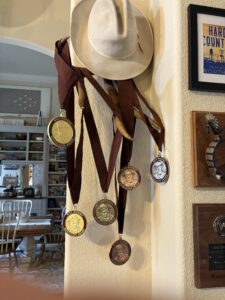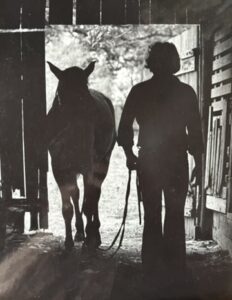Memory fails, and I think I might have discussed awards sometime back, but I recently had a discussion with another well-known author about contests, and the mega-selling New York Times writer made a couple of good points.
“I like awards because I’m a little selfish. I enjoy seeing my work recognized and the truth is, they look good on my wall and in my office. They go hand in hand with the satisfaction of a job well done, and that’s exhibited by my body of work itself.”
I agree completely.
Neither he nor I came from the Participation Trophy world, and value well-earned recognition. It’s the inspiration that feeds souls.
I was a baby-teacher way back in the late 1970s when that idea of Trophies for Everyone was announced in a staff meeting.
“Each child who participates will get a trophy,” said my moronic starter principal. I worked under several great educators, but this guy phoned it in with two tin cans and a string. Though I have to admit, participation trophies weren’t his idea, but I wouldn’t have put it past him. “It’ll make the kids feel better to take something home for their effort, and will build their self-esteem. There will be no losers.”
Even though it was a faculty meeting, and I was an adult, I raised a hand as I was taught back in elementary school. “No one will try as hard if everyone gets a trophy.”
“The winner’s trophy will be a little bigger.”
“If everyone wins, no one wins. Let em put it this way, once they get out in the real world, they won’t be handing out trophies for a job well done. They’ll distribute paychecks, and there will be no reason to try harder than others, if everyone gets the same amount.”
He blinked once. “You can put your hand down now. Any other questions?”
“Yep. Why did Nixon get us in bed with Communist China?”
“You’ll have to ask the government teacher over there. Now, moving on, some of you are backing into your parking spaces, and that gives our parents the wrong idea that you’re in a hurry to leave school once the day is done…”
All right, I come from a generation who likes to win. I was once cheated out of a first place ribbon in an elementary school three-legged race when the binding came untied after my partner and I crossed the finish line, but I don’t hold that against Coach Mankin (I really do).
One of my grandsons was cheated out of first place in a rodeo mutton busting contest last year. He held on for the full eight seconds, but another competitor took home the buckle because her parents were part of a prominent local family. I knew we’d lost when I saw they were all in their Sunday best and were already lining up for a photo even before the winner was announced.
But back to awards for writing, my friend was right. For authors struggling for recognition in a crowded and confusing landscape, awards offer credibility and a somewhat elevated status for others to see. With 11,000 books releasing every month in this country, these nods toward hard work and creativity help us gain recognition in a firehose output of new books.
I’ll be at the Will Rogers Medallion Award ceremony this time next week, and I’ll find out where my novels The Broken Truth and The Journey South fall as a finalists in Western Modern Fiction, and Western Traditional Fiction categories, respectively.
The awards won’t be accompanied by a check, only by the satisfaction that they were deemed worthy by my peers. That’s what I’m after.
There are two Spur Awards on my wall from the Western Writers of America association. Many of the traditional westerns I read as a kid proudly proclaimed they were Spur winners. As an adult I looked for that recognition on the covers of their books.
I wanted one of my own.

I count six Will Rogers Medallions in my office, and no matter if the above-mentioned novels win Gold, Silver, or Bronze, two more will look good in this collection, in my opinion.

I was also honored with a Benjamin Franklin for my first novel, The Rock Hole, and John Gilstrap and I learned a few years ago that we’d won the Kops-Fetherling International Book Award for our work. I still don’t know what that one is, but the gold award seal is nice.
I once took first place in a photographic competition. The photo was a silhouette of my cousin leading his horse into a barn. I had to wake him up late that morning after he’d been out all partying all night, and simply getting him to walk in a straight line was a challenge. The horse cooperated and only required a couple of carrots.
By the way, that barn, the hallway they’re in, and the often patched tack room on the right figured in more than one novel through the years.
Winning that little contest helped spur me on to an extremely successful side career in photography. It lit a fuse that still glows from time to time.

I now have my sights set on a Bram Stoker Award for Comancheria next year. If I win, great. If I don’t, I’ll know that I was in the company of great authors. That’s enough, but I don’t want a participation trophy. Only the real thing, because…
…a respected book award reaches out to both online and store browsers saying, “This is a great book, and worthy of your time and money.” It helps readers weed through the thousands of books that figuratively sag the shelves every year.
It also builds personal self-esteem in an extremely competitive business, and are a way to let other authors know that people out there value your work. Awards come with a word of caution, though.
Some entries require a submission fee. This often comes out of the writers’ pockets, but many times publishers accept that responsibility.
Just because you win first place or gold, doesn’t mean your book will sell any better. There are no guarantees in this business. However, it’ll look good on a resume.
Judges are human. They might see something different in your book, be it good or bad. I’ve judged a number of contests, and when my list was compared to other judges’ opinions, they might not have been the same.
So why bother in the first place?
Personal validation is the best reason I know of. If you see it as that, and no more, you won’t be disappointed.

Yes, I don’t have any interest in the trophy/certificate for participation way of thinking, though it’s quite common. But it is nice to be recognized when your work does stand out.
Not in the realm of published books, but I’ve been recognized 3 times and I can’t tell you what it has meant to me over my lifetime:
1) From 40+ years ago I still have the marble & plastic combo trophy I won for directing the winning 1-Act play in high school. It has made multiple moves with me across the country & is a treasure to me.
2) In 2010 (how can that be 15 years ago already!!!) I earned first place in ACFW’s historical fiction category of the Genesis contest & keep that plaque handy to remind to keep pressing on no matter how slow I am.
3) 3rd example isn’t a certificate or trophy, but in 2014 I was taking a class at community college and my instructor took the time to write me a thoughtful note where he told me he was so impressed with my honors project paper that he read it 3 times and that it really struck a note with him. I have that email printed out & mounted on a piece of foam board.
As far as a reader/customer seeing books receive awards, as you note in your post, it helps a writer’s books stand out in a vast sea of options. But as a reader, how much attention I pay to an award depends on what it’s an award for. I’m going to sit up and pay attention to something receiving a WWA award. But I might screen OUT a different book if it has won an award for something that I philosophically don’t agree with–but that helps me as a customer not to waste time/money on purchasing something that I’m not going to like (back cover blurbs sometimes aren’t helpful for really figuring out what a book is about).
But I’m glad there are good legit awards and recognitions for writers. As much time as we pour into writing a book, it’s wonderful to see writers receive that recognition.
I don’t know if I’ll ever “screen out” a book because of an award. They usually catch my attention. To me it shows how much others value that work, and that professionals appreciated the creativity.
I remember back when I was a kid and saw The Island of Blue Dolphins won a Newbery award. I didn’t know what that meant, but the seal on the cover told me it was special.
Thanks for weighing in!
Good luck next week, Reavis, at the Will Rogers Medallion Award ceremony. I hope you bring home another trophy. I won my first award at age 8 when my box turtle, Spot, got First Prize for the Ugliest Pet at the local park and we got a blue ribbon. The credit goes to poor Spot. I just hauled him to the contest in a shoebox
When I was nominated for an Agatha award, someone rather nastily said, “Those awards are popularity contests.”
My editor answered, “Popular people sell books.”
I am honored and thrilled to be nominated and to win.
There are always naysayers, and I don’t listen to them. It’s like reviews, which I might discuss later. They’re out there, and feel good when someone likes our work, but sometimes they’re so far off the rails it’s laughable.
I actually did a presentation on contests/awards–do they mean anything?–for my Coast-to-Coast Crime Writers group last year. I’ve been entering contests since I began writing novels and I’ve won or placed in several. Why do I do it? For many of the same reasons you mentioned. It feels good to get that validation/affirmation, like maybe I have the hang of this writing thing. I’m competitive. I like putting award-winning author in my bio. The judges in the Readers Choice Award (which I’ve won in the contemporary romance category twice) are in fact readers who talk to other readers.
For the presentation, I asked my published what she thought of awards/contests. She said she wouldn’t sign an author because she won awards, but it certainly didn’t hurt. My agent said something similar. But I noticed in her pitch for my current general market project she included a couple of awards, particularly TRUST ME being a Silver Falchion finalist for KillerFest. My friend and fellow CCCW member Pat Bradley has won some awards too. She said with an award and a $1 she could buy a cup of coffee (She was talking about at McDonald w/a senior discount she later clarified). At the beginning of my career, I won a Genesis Award for unpublished writers from ACFW. That attracted the attention of an agent who eventually signed me. Mary Sue has passed on, but I’m still with The Seymour Agency 15 years and 32 books later. One more thing, it can be fun. For the ACFW Carol Awards, finalists get to enter the the awards gala ballroom early, sit in the front at reserved tables with family/agent/editor, see their book cover and blurb flash on the screens during dinner (and throughout the conference at lunches), see their names in the conference booklet and the gala program, and bite their nails while the winners are announced. It also gives a lot of publicity to your book at a conference filled with agents, editors, writers (who are readers), and industry media. I’ve done it twice and had a blast. So yes, I told my group it was worth it–especially now that you can enter with PDFs instead of expensive snail mail. Winning awards may not sell a ton of books, but it certainly doesn’t hurt. And it feels good to win.
It IS worth it, and I’ll continue to enjoy seeing my books entered into valued, legitimate contests. Besides, I still have space on my walls….
The biggest surprise of my so-far-two-book writing career was paying for an Editorial Review and later finding out that Indies Today had awarded the first book 2021 Best Contemporary novel.
The review was gold – the reviewer called that novel ‘A flawless literary gem.’
I had no expectations of any kind of award – a LOT of books were in competition (if everyone is a Finalist except for those who could not spell their way out of a paper bag, the Finalist award is literally a joke, and useless for marketing to anyone who knows) – but that book took 15 years of my life, and the validation was lovely. And not shared with anyone else.
It DOES make a difference for the winners. Those were fifteen very long years learning to write well, learning to plot, learning all the technical skills you don’t pick up from reading (but from reading you will know when something is missing from your work).
It fuels your future work. It validates the millions of decisions you had to make to get your book into physical form.
There should be a chart somewhere showing the relative value of awards, but there are too many which basically give you an award for giving them money. Award-value inflation is rampant. There are some very valuable awards (a Pulizter for literature is nice) – and zillions which, when someone announces they have won, I am glad I didn’t enter after I chase down its parameters – I dumped an early award when I found out that they had oodles of finalists, so ‘Finalist’ was meaningless.
Most readers probably won’t bother to check or don’t know what matters, so it’s an easy marketing ploy if you have a bit of money.
But your fellow writers will know.